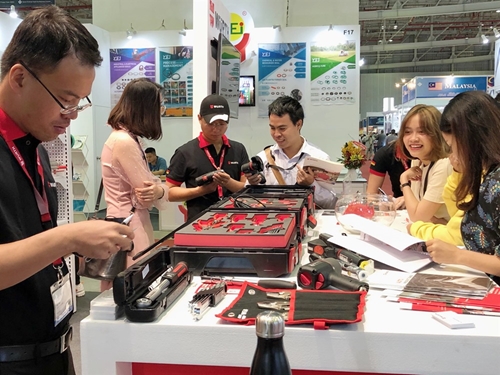Speaking at a recent seminar on auto industry, held during the Automechanika HCM City expo, Nguyen Thanh Dam, Chairman of Vast Group JSC, said that production reached 215,000 autos last year, which was modest compared to other countries in the region.
    |
 |
|
A booth at the Automechanika HCM City Expo, a regional trade fair for the automotive service industry that is open in HCM City from February 28 to March 2. |
This accounted for just 0.2 percent of the number of vehicles produced globally.
More than 352,200 units were bought in Vietnam last year, ranking fourth in the ASEAN region after Indonesia (1.1 million units), Thailand (950,000 units), and Malaysia (560,000).
The average number of cars per 1,000 people in Vietnam was still low (at 23 cars per 1,000 people) compared to other countries, Dam said.
With an increase in income, a “golden demographic” with the number of people having good earnings now accounting for 52 per cent of the population, demand for cars among young families and car consumption is expected to increase strongly.
“There will be fierce competition among large automobile companies this year,” he said, adding that carmakers would launch many new models to expand their market share.
The automobile market is expected to grow by 10 percent this year, he said.
But the underdevelopment of the supporting industry, the low localisation ratio and tax policies that result in high car prices have affected the development of the automobile industry.
To make a car, between 30,000 and 40,000 accessories and parts are needed, but in Vietnam more than 90 percent of these accessories and parts are supplied by parent companies or other foreign companies, they said.
According to the Ministry of Industry and Trade, Vietnam has 358 businesses involved in automobile production, including 50 automobile assemblers and 214 accessories makers.
Local companies have produced simple accessories, such as a body shell, cabin shell, gear boxes, car seat, and brakes, with low technology content and value addition.
Acknowledging the situation, the Government has devised policies to boost the development of the local supporting industry to increase localisation rates as well as enable more local enterprises to participate in the automobile production chain, delegates said.
In addition, trade fairs will offer opportunities for local firms to learn about the latest accessories and parts as well as new car models, and explore cooperation opportunities with foreign partners, they added.
Source: VNA